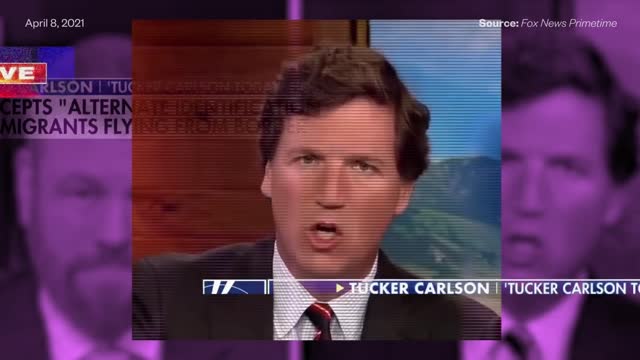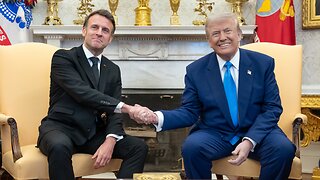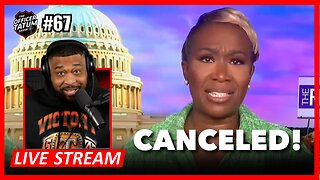Premium Only Content

Tucker Carlson's Great Replacement Theory Is Spectacularly Wrong
Friday, May 27, 2022
ReasonTV
778K subscribers
The great replacement theory is spectacularly wrong in asserting that the government is going to create millions of new citizens overnight. And it's wrong too, that in the unlikely event that happened, they will be "obedient" in voting for Democrats.
https://reason.com/video/2022/05/27/t...
-------------------
Tucker and his pals are also really worried about the government giving all sorts of new and better stuff to immigrants—brand-new bikes! twice the allowance!—but he's got it backward. Immigrants consume fewer welfare benefits than native-born Americans (about 39 percent less in average cash value). And when the U.S. has had a relatively open-door policy, government spending grew less quickly than in periods when immigration has been restricted.
The last truly major immigration law was passed in 1986 when Ronald Reagan signed bipartisan legislation that ultimately allowed 2.7 million illegal immigrants—mostly from Mexico—to gain citizenship. Since then, reform in Washington has proven elusive. Indeed, like George W. Bush's attempt in the mid-2000s, Joe Biden's stated desire to provide a path to citizenship for 11 million illegals has gone exactly nowhere, partly because he has maintained and even expanded some of Donald Trump's most-draconian policies.
But even if those immigrants somehow became citizens overnight, would they automatically vote for Democrats and produce what Rep. Stefanik calls a "permanent liberal majority in Washington"?
Consider this: Within a few years of Reagan's amnesty program, the GOP took control of the House for the first time in 40 years and held it from 1995 until 2007; they basically did the same with the Senate. After losing majorities in the Obama landslide, they've managed back majorities as well. So over the past 40 years—a time of high immigration—the Republican party has somehow managed to secure more congressional power than they did during the previous 40 years.
More recently, between 2016 and 2020, Donald Trump made gains with every demographic group except for white men. In the 2004 election, George W. Bush grabbed 44 percent of the Hispanic vote, only 5 points off the 49 percent of the Hispanic vote he secured in the 1998 Texas governor race. Believers in the great replacement theory might be surprised to learn that Greg Abbott won 44 percent of the Hispanic vote in his first run for the governor's mansion in 2014 and that Texas and Florida are not only the two fastest-growing major states, but they are also major magnets for immigrants and yet keep getting more and more Republican.
There's at least one more thing to consider too: Rep. Stefanik and other replacement theorists routinely inveigh against "reckless spending" and the need to "rein in government spending." But higher levels of immigration seem to discourage big hikes in government spending. It was only after the United States closed its borders that government spending ratcheted up sky-high.
As Alex Nowrasteh and Andrew C. Forrester of the Cato Institute have documented, between 1921 and 1968, restrictive immigration laws cut the percentage of the population that was foreign-born from 13 percent down to 4.8 percent. During that same period though, the New Deal and Great Society programs caused government spending as a percentage of GDP to soar from 6.9 percent to 18.9 percent—a hike of 174 percent. Immigration laws were loosened up in 1968, and the foreign-born population grew to almost 14 percent in 2017. Yet over the same time period, federal outlays as a percentage of GDP went from 18.9 percent to 20.4 percent, an increase of less than 8 percent.
What explains this phenomenon? "The Great Depression and other ideological shifts in public opinion were necessary for big changes in American policy during the New Deal, but they were politically possible because closed immigration removed the politically-effective immigrant welfare-queen argument," according to Nowrasteh and Forrester.
Ironically, if proponents of the great replacement theory actually want to get government spending under control, they'd best start lobbying for more newcomers, including from countries whose descendants voted in bigger numbers for Donald Trump in 2020 than they did in 2016.
Written and narrated by Nick Gillespie. Graphs by Issac Reese and Adani Samat. Edited by Regan Taylor.
-
 7:32:37
7:32:37
Akademiks
10 hours agoDrake and PartyNextDoor '$$$4U' Album Sells 250K first week. BIG AK IS BACK.
110K11 -
 3:12:08
3:12:08
MyronGainesX
10 hours ago $30.72 earnedDan Bongino Named As Deputy Director Of FBI And CPAC Recap
89.9K27 -
 3:12:31
3:12:31
vivafrei
9 hours agoBarnes Live from Seattle - Defending Benshoof in a Case that is CRAY CRAY!
130K45 -
 2:12:12
2:12:12
Robert Gouveia
9 hours agoLiberals EXPLODE over Elon's Email; Lawsuits FLY; Sanctions?? Congrats Dan!
103K35 -
 1:33:36
1:33:36
Redacted News
10 hours agoBREAKING! PUTIN LAUNCHES MASSIVE OFFENSIVE IN UKRAINE AS EUROPEAN LEADERS PUSH FOR MORE WAR
181K243 -
 44:39
44:39
Kimberly Guilfoyle
10 hours agoBetter Days Ahead for the FBI, Live with Asm Bill Essayli & John Koufos | Ep.199
115K24 -
 1:40:29
1:40:29
In The Litter Box w/ Jewels & Catturd
1 day agoWhat Did You Do Last Week? | In the Litter Box w/ Jewels & Catturd – Ep. 748 – 2/24/2025
152K41 -
 23:34
23:34
Stephen Gardner
10 hours ago🔥CNN PANICS over $5000 DOGE Dividend | Trump Orders bigger Audits
96.2K163 -
 1:53:54
1:53:54
The White House
12 hours agoPresident Trump Holds a Press Conference with President Emmanuel Macron of France
104K89 -
 1:48:31
1:48:31
The Officer Tatum
12 hours agoLIVE MSNBC DROPS HAMMER On Joy Reid as STAFFERS PANIC! + More Ep 67
135K87